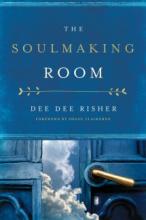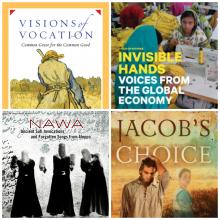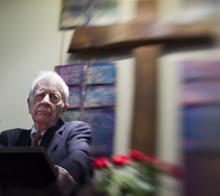Vocation

IT'S PARTLY THE times and partly my own overthinking, but lately my mind keeps going toward the ways it could all fall apart. American democracy feels fragile, like a teacup on a saucer that’s partly hanging over the table’s edge. And companies and governments, though fully aware of what they’re doing, continue to tug voraciously at the threads that hold our ecosystems together, permitting more pipelines and drilling and business as usual.
Some have called our current era “the dying gasps” of late capitalism. The bubble of exponential economic growth, powered by the extraction of millions of years of decayed organic matter stored as carbon-rich fuel beneath the ground, can’t last forever. Neither can our living beyond the Earth’s means, though the endless options on e-commerce sites suggest otherwise.
It is too easy to surround myself with shiny new things to ease the sense that the world as we know it is ending, to buffer my sense of self with what feels familiar and safe. But then I wouldn’t be awake to what is being birthed in the wake of the dying colonial project. As much as it’s terrifying and full of risks, I want to get my hands dirty in the collective creation of a better world.

SOJOURNERS HAS GONE through various phases since our founding almost 50 years ago. In the earliest days, we were an intentional Christian community that sought to effect change in the world around us, including through our magazine. Now we’re a faith and justice magazine with historical roots in Christian community. There’s a difference. But among the things that haven’t changed in five decades is that for most of us here the language of “vocation,” rather than “job,” rings true, and that vocation is connected to the vision of helping to make the world a more just place.
For our new art director, Candace Sanders (see facing page), that includes the opportunity to offer a platform to artists who are too often rendered invisible, especially in some church circles. For many people, Sanders says, “it’s so hard to get your work seen—and people don’t usually get art in those places where decisions are being made.” Sanders looks forward to being a connecting link for underrepresented artists: “There’s power in that,” she says. “I don’t take that lightly.”

Piety’s Dark Side
Love the Sinner is a short documentary narrated by queer filmmaker Jessica Devaney, who grew up in a conservative evangelical church. In the wake of the 2016 Pulse nightclub shooting, she takes a hard look at the connection between Christianity and homophobia. lovethesinnerfilm.com
Crisis and Conscience
Simone Campbell, Kelly Brown Douglas, Jacqueline M. Hildago, George “Tink” Tinker, Kwok Pui-lan, Jim Wallis, and others write about the “confessional crisis” of our political era and possible faithful responses in Faith and Resistance in the Age of Trump. Edited by Miguel A. De La Torre. Orbis
A Lifetime Adventure
Calling All Years Good: Christian Vocation throughout Life’s Seasons explores calling as something we wrestle with not just as young adults but “from infancy to old age,” combining social science insights with practical theology. Edited by Kathleen A. Cahalan and Bonnie J. Miller-McLemore. Eerdmans
Hard-Won Wisdom
John M. Perkins, co-founder of the Christian Community Development Association, has spent decades working for a gospel that is inseparable from racial and economic justice. In the memoir Dream With Me: Race, Love, and the Struggle We Must Win, he reminds us, “It all comes down to love.” Baker Books

THE ROLE AND identity of the minister has always been complex: Preacher and teacher, pastor and prophet, counselor and social worker. Despite this inherent dynamism, church structures—seminaries, congregations, denominations—often focus on transforming diverse candidates for ministry into a uniform class of spiritual professionals equipped to serve Christ in a bygone era. Responding to the challenges facing congregations today involves hearing and sharing the gospel in fresh ways, which requires a revolution in how ministers understand themselves and the training they receive.
Cynthia G. Lindner’s Varieties of Gifts does not read like a revolutionary text, but it is iconoclastic. While Lindner does not argue directly with the many books on pastoral leadership encouraging conformity to a specific mold, she gently brushes them away with a thoroughly postmodern conception of the “well-lived pastoral life.” Drawing on insights from dialogical psychology, which highlights the “multiplicity” of the human self, Lindner brings attention to the diverse talents and perspectives of aspiring and seasoned pastors. Too often this plurality is perceived as vocational ambivalence or personal confusion—an obstacle to be overcome in the modern quest to create a unified, coherent sense of self. Yet this pursuit of a single identity deprives ministers of important resources, limiting both their professional effectiveness and satisfaction.
Varieties of Gifts seeks to end this repression and embrace the minister’s natural multiplicity. Lindner believes this path leads to the realization of untapped potential at a moment when religious institutions are desperate to discover new and different ways of being faithful. She writes, “effective ministers have always inhabited plural roles and multiple selves which have funded the flexibility and inventiveness that religious leadership demands over the long haul.” Thus, the internal tensions of the minister’s life (How do I serve this community as both prophet and priest? How do I remain authentic while embodying a role defined by perception?) become a resource in the pursuit of excellence rather than a distraction that promises to lead one astray.

I never expected to be here—unsettled, sometimes looking over my shoulder at so many precious and lost moments. I expected to always look forward, always be moving somewhere. I yearn for some fruition of my dreams: a time when racism and the earth are healed, when every child is loved to his or her full potential in every way, when my lover and best friend never doubts his beauty, when I am the person on this earth whom I long to be. I long for the certainty that my children possess—that they will save the frogs.
I did not choose these dreams of mine. They were given to me. I’m sure of it. The Spirit beckoned them, whispering: “Dee Dee, this is part of my vocation for you. Strive to make these dreams a reality. I will go with you.” And with that God-inspired passion at my back, I plunged ahead, doing my best to be faithful to what was asked. Truth be told, I expected to bring at least one dream to fruition—given all the heart that I was willing to pour in and all the need and the rightness of the causes.

The gospel account of the transfiguration of Jesus comes at a time when we desperately need its powerful message of encouragement. Our nation is in the midst of an epidemic of what I call “a degenerative discouragement syndrome”. The news cycle enumerates a list of issues and concerns which seem to resist remediation or repair.

Peace studies combine research, analysis, and practice in an attempt to answer questions of what peace actually requires, why accepted wisdom has failed to move civilization away from violence and toward peace, and how people have successfully reformed social, economic, and political relationships to achieve sustainable peace. And through this study, real-world answers are emerging.

I WAS IN A MONASTERY the other day and got to talking to a monk who, when I asked him why he was a monk, why he volunteered for a job liable to loneliness, a commitment to an idea no one can ever prove or document, a task that entails years of labor in the belief that somehow washing dishes and cutting grass and listening to pain and chanting in chapel matters in the long scheme of things, said, because it’s hard.
I was startled; sure I was. You would be, too. Rarely do people say with a grin that they do something because it is hard to do it. But he said it again, still smiling, and then he talked about it for a while, haltingly at first, as he felt for the words, and then with a lovely flow, like something let loose from a dam after a long time pooling behind the dam.
Because I am not sure I can do it at all, let alone do it well, and do it for years and years, perhaps for my whole life, he said. I cannot think that way. I try to be a good monk for a week at a time. Walking helps greatly, I find. Also birds. We have a resident heron here who has been a great help to me. Sometimes he or she is right there by the reeds when I am in pressing need of a heron. I have come to think that the birds are shards of faith themselves in mysterious ways. You could spend a whole life contemplating birds and never come to the end of the amazing things they do. There are many swallows here and I spend hours at a time watching them conduct their intricate maneuvers. They have the loveliest gentle chitter with which they speak to each other in the air. Remarkable creatures altogether. When I was first a monk I was of a mind to adopt one as a pet, and I actually got a ladder and climbed to one of their nests, but when I loomed into view there, surely a great horror to the parents and the young ones, I could not find it in myself to reach in and steal a child. I went back down the ladder and went to the chapel.

An early fellow Sojourner, Perk Perkins, reminded me this week that not long after we started Sojourners as a new Christian magazine for justice and peace, I came running into our little office one day and exclaimed, “Dean Smith is a Sojourners subscriber!”
Here were young Christians in Washington, D.C., saying our faith called us to racial and economic justice, opposing the nuclear arms race, ending the death penalty, and supporting the equality of women. And the greatest college basketball coach in the country was reading Sojourners?!
Dean Smith died on Saturday. He was 83 years old.
Monday’s front page New York Times story — not just in the Sports section — was titled, “A Giant of College Basketball And a Champion of Equality.”
ESPN and everybody else ran the numbers. But all the tributes and comments on the death of Dean Smith have quickly moved on from the numbers. Current UNC coach, Roy Williams, said his predecessor "was the greatest there ever was on the court but far, far better off the court with people."
Player after player who were coached by Dean Smith, as famous as Michael Jordan to those who barely walked on to the team and hardly ever played, testified in the last few days to how much more than a coach he was to them — their “mentor,” “teacher,” “second father,” “role model,” life-long inspiration and guide.

At Sojourners, our interns have the chance to meaningfully put their faith into action for social justice. Placed in entry-level positions throughout the office, interns are given significant responsibilities that range from writing for the blog to managing relationships with donors to collaborating on mobilizing initiatives.These full-time jobs are combined with mentorships that help connect each intern’s professional development with their vocational discernment.

I’ve become a big fan of author Anne Lamott. How can you not love someone who says her thoughts about others are sometimes so awful "they would make Jesus "want to drink gin straight out of the cat dish?”
And when she screws something up — which would be often, of course — she has a “Bad Mind” that starts telling her she’s such a loser. Always has been, always will be.
I know that voice. A couple of weeks ago, we talked about that voice at church. Our reading was the story about Jesus getting baptized in a muddy river and how he heard a distinct and unmistakable voice talking to him as he stood there dripping. The voice called him beloved. Reassured him that he was loved, deeply and passionately. In our discussion after the reflection, I mentioned Anne’s "Bad Mind" and how it’s often my mind too, screaming to be heard and believed. Our pastor — who also likes Anne — asked if anyone else hears that Bad Mind voice. Everyone raised their hand. Nodded, too.
Yep. We all seem to be on a first-name basis with that voice. At least I’m not the only one.

I was once asked to participate in our organization’s "Take Your Daughter to Work" celebration, and found myself both amused and challenged when one of our young participants queried the panel, "Does your work interfere with your life?"
My initial reply was that my work is a very important part of my life — something that is central to it, and that adds meaning, structure, and texture. Since the time of that panel discussion, I’ve thought a lot about what else I should have said. So I want to use this opportunity to share some additional thoughts — about how to have a youth work career that enhances your own life as well as the lives of others.
Here are what I regard as a few guiding principles.
ON A RECENT Friday afternoon, Joe Bank makes his way quietly through the stacks in the San Francisco Public Library’s main branch. Books aren’t on the 33-year-old’s mind. He’s on the lookout for people in need—people who might need the same social services he once did, when he was homeless and living in a city park.
Bank isn’t just a concerned fellow citizen—though he certainly is that. He’s also on the job, as part of the country’s first in-house, library-specific social work team. Officially, he’s known as a HASA, one of six Health and Safety Associates employed by the library in partnership with the San Francisco Department of Health. The public library HASAs are all formerly homeless, thereby possessing an innate ability to notice the telltale signs of unhoused people in need of a helping hand. Bank’s boss is Leah Esguerra, the country’s first full-time psychiatric social worker employed in a public library.
Esguerra’s small outreach team is tasked with more than answering questions or offering help to clients who need assistance locating or securing social services. HASAs also train library staff on how to respond to patrons in need and how to diffuse and de-escalate tense situations with calm, collected compassion. Furthermore, working as a HASA is a six-to-12-month vocational training program, after which the outreach workers can graduate to other social service jobs. (Bank is currently the only HASA who has stayed on longer than a year.) Esguerra says that because her staffers are all formerly homeless, they find a special purpose in their ability to give back to people in situations similar to their own. “They love the routine and their contribution,” she explains.

Life with Purpose
In Visions of Vocation: Common Grace for the Common Good, Steven Garber writes eloquently of the challenge "to see with the eyes of the heart, to see oneself as responsible for the way the world is and isn't" without succumbing to cynicism. IVP Books
Saved Songs
Just months before civil war erupted in Syria, a small group of Syria Sufi musicians known as NAWA were recorded peforming nearly lsot melodies, songs, and poems on Ancient Sufi Invocations and Forgotten Songs from Aleppo. This is the first album in a planned four-part Sacred Voices of Syria series. Cowbell/Lost Origins

WE LIVE IN an age in which we are encouraged to make decisions that further our personal benefit. This attitude is so pervasive that it extends even to our spiritual lives.
There is a danger in making our faith so personal and inward, so focused on the first commandment to love God with all our hearts, minds, and strength, that we forget to keep the second commandment to love our neighbors as ourselves.
Though our culture would tell us to look out for number one, Christ’s upside-down kingdom offers a different and subversive message: Lose your life and you’ll find it. The church was designed to display the “manifold wisdom of God” by creating a community full of people who, like Jesus, put others before themselves and seek the common good. Christian community is intended to be a living witness, to demonstrate and to anticipate the future of the world that has arrived in the person of Jesus Christ.
In other words, it’s impossible to keep the second commandment without loving God with everything we have, but it’s also impossible to keep the first without loving our neighbors as ourselves.
A thriving common good and the quality of our life together are deeply affected by the personal decisions we all make. The commons—those places we come together as neighbors and citizens to share public space—will never be better than the quality of our own lives and households.


A NEW CALENDAR YEAR marks the end of the Christmas season and a shift to the season of Epiphany that spotlights the reality of the Incarnation. In sync with our personal promises to discontinue bad habits in favor of better practices, the lectionary readings capture familiar expressions of vocational clarity and ministerial frustration. The season is a mosaic of self-examination peppered with moments of great light penetrating the darkest despair. Whether ancient Israel (living in exile in the sixth century B.C.E.), the followers of Jesus (in the first century C.E.), or 21st century seekers of spirituality without religion, the description is the same: The disenfranchised, disappointed, and divided discover a glimpse of the reign of God.
Read these texts as snippets of ancient social media: status updates of a prophet, blogs about the ministry of Jesus, and PDF files about early church practices. Each exposes the light of God pushing into the darkness of human existence: frustrated ministers, radical promises of forgiveness, reports of flourishing charismatic leaders, stalemated efforts due to divided affiliations, petitions for lawmakers to practice impartiality, and the death of one imprisoned on suspicious testimony. Familiar, jarring, and too often tamed, these texts deserve at least the attention afforded public policy debates and celebrity rumors.
A close reading of the text does not lend safety by avoiding the prophet, ignoring John’s message, or disputing baptism rituals. Every baptized believer is called to arise and live as if the kingdom of God has come.
“WE WANT FARMERS to rediscover the sacredness of farming,” says Rev. Daniel Premkumar. Premkumar’s respect for farmers and farming grew from his experience of serving for nearly 40 years as a Lutheran parish priest in Andhra Pradesh, the “rice bowl” of India. “We have forgotten that the people who grow our food play a critical role in the care of creation,” he says. “That is why we are creating a farmers’ Bible.”
We sat in his office at the Synod of the Church of South India, the largest Protestant church in the country, in Chennai. The church includes 10,000 Protestant congregations (Presbyterian, Congregational, Reformed, Anglican, and Methodist) across South India. Rev. Premkumar is now director of diaconal concerns for the church, and he is advancing the concept of agri-ministry, which views agriculture as a form of ministry and upholds the need for church ministry to directly address the concerns of farmers. He created the Agricultural Workers Fellowship (AWF) in 2011. A small AWF workshop where theologians and farmers came together to discuss agricultural perspectives on biblical passages led to the idea of a book offering a reading of the Bible from the farmers’ perspective. They hope this book and a farm workers’ devotional guide will be finished by 2014.
The initiative to spur the church to explicitly integrate faith and agriculture comes at a time when food and farming in India—and globally—is at a critical juncture. Will India follow the United States in relying on genetically modified crops, monoculture, inorganic and unsustainable farming practices, and the corporatization of agriculture? Or will it restore farming as a livelihood, emphasizing safe food and healthy soil and water?

After traveling the country this spring — while keeping an eye on Washington, D.C. — I am more convinced than ever that our personal decisions, choices, and commitments will change the world more than our politics. The message in the Epilogue to On God’s Side says this as well as I could do again. It’s short and very practical. Here it is:
The common good and the quality of our life together will finally be determined by the personal decisions we all make. The “commons” — those places where we come together as neighbors and citizens to share public space — will never be better than the quality of human life, or the human flourishing, in our own lives and households.
Here are ten personal decisions you can make to help foster the common good.

Gordon Cosby was my spiritual father, not simply a brother in Christ. This relationship continued for some 45 years until his dying days. In a time when egalitarianism defines nearly all relationships as the desired norm, it’s well to remember the role of mentors who maintain, purely through their own internal integrity and faithfulness, a spiritual authority in the lives of others. Gordon Cosby was such a person to me, and to countless others.
I first encountered Gordon when I was a young legislative aide on the rise in Washington, D.C., working for Senator Mark O. Hatfield and his legislative efforts to end the Vietnam War. Disgusted with the moral vacuity of the evangelicalism that had been my heritage, but searching for faith that was more than just following a progressive social agenda, I discovered the Church of the Saviour. Gordon’s insistence that following Jesus required a disciplined inner spiritual journey always expressed in joining God’s outward mission in the world captivated me then, and ever since.